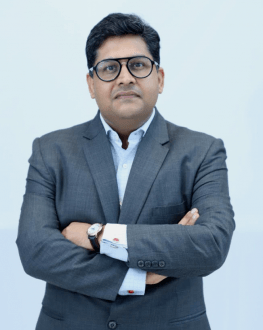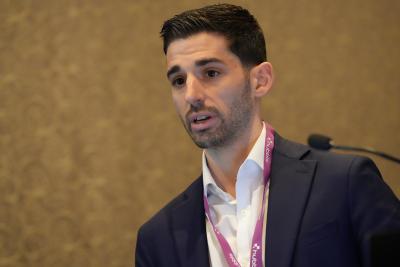Lighthouse Canton India’s CEO Surveys the Evolution of India’s Private Wealth Investment Market & Trends

Sumegh Bhatia of Lighthouse Canton
Nov 24, 2022
What investment products and themes are of interest for U/HNW clients in India today? What developments have we seen in the delivery of advice and investment solutions? What sort of global diversification is taking place? What are wealthy investors buying at home? What about private markets and alternative assets? And what does the future look like? Sumegh Bhatia, CEO & Managing Director for India at Lighthouse Canton offered his insights on these subjects as one of our expert speakers at the Hubbis India Wealth Management Forum in Mumbai on September 7. We have summarised some of his views in this short report.
Sumegh opened his comments by remarking on the rapid and significant expansion of demand for innovative products. “We are a global investment institution specialising in wealth and asset management services across different markets and jurisdictions,” he told delegates, furthermore that international mindsets are now emerging in India similar to the wealthy investors in Singapore and/or Dubai.
“For the past couple of years, amongst the clients we serve such as single-family offices and institutions, we have seen a strong impetus towards thinking outside the box,” he explained. “For example, a fellow panellist gave the example of infrastructure funds, which have appealed to clients who are interested in returns but also in principal protection. They are looking for alternatives that can provide them cash flows, as well as give them some upside.”
Sumegh further added that Lighthouse Canton has recently launched a venture debt fund in India and had raised funds also for an early-stage private equity fund. “We were actually surprised, because in a matter of three months, we had launched and closed our first venture capital fund. were able to raise USD40 million, just from single-family offices and a few institutions. That shows the extent of the demand.” Touching on the firm’s expertise in innovative strategies, he explained. “We also run one of the largest specialised real estate funds in India. So we understand the alternative space and we are constantly on the lookout for more alternative investments. Our clients are seeking more ideas for alternatives investments, and they come to us to solve for their requirements, and that is what we aim to do.”
Sumegh expanded on the private equity arena, right from start-up funding to pre-IPO finance. He explained that this broad universe is of interest to leading institutions and quasi-government entities, as well as to UHNW and HNW investors. “We classify investors in three buckets, institutional, single-family offices and then U/HNWI. There is great acceptance and interest in India from the institutions to explore alternative investing through strategies like venture debt or private equity.” he reported. “The demand is across the board, in funds that target early stage, growth stage or pre-IPO crossovers. And we see the interest in venture debt growing. We estimate that last year, venture debt was about USD600 million, and private equity to about USD31 billion. As we can see there is a huge difference to how capital has been raised in venture debt as against private equity, but we see this changing in the next two to three years. ”
In the wealth segment, family offices are major participants. “Single-family offices are very typical clients who have made wealth, their objective is obviously preservation. As such their portfolio is typically in yield plays, for example in structured credit, and they do keep some part of their portfolio aside for growth investing. By and large, this is mostly in early stage or growth stage, as this is where the maximum returns can be made. Pre-IPO typically does well when obviously there is a lot of buoyancy in the market and the IPO market performs, as we have seen in recent years since the worst of the pandemic sell-off. But typically, the larger allocations amongst the single-family offices are typically towards early stage and growth stage.”
He reported that SFOs had been investing in private markets going back five to 10 years or perhaps more and worked with a lot of entrepreneurial type brand-name fund managers, just like Sequoia or Softbank would have made money for international investors. “They are very fixated on entrepreneurial managers who have relevant experience, have seen cycles in private markets, and they also look for co-investing opportunities as an extension of their business lines. In particular, the second and the third generations of wealthy families think it is a great idea to work with these managers to figure out what is happening in the new ecosystem. In short, we expect more and more interest in India in private markets, mostly equity, but also private debt.”
As the conversation turned towards offshore investments and trends for such investments Sumegh brought forward his observations from the firm’s offices in Singapore and Dubai. He noted that there has been a growing number of Indian families looking to establish offshore investments, and set up foreign structures and vehicles.
“Over the last few years, our Singapore and Dubai offices have seen an increase in the number of families from India looking to take their money offshore legitimately and compliantly.”
He closed his observations by sharing which asset classes he sees rising amongst SFOs and institutions in the coming years. In these closing remarks he mentions that he sees SFOs increasingly investing in hedge funds. “Single-family offices have created their wealth, and like the concept of hedge funds protecting wealth but also opening the doors to make some money off the markets,” while on the institutional side, private markets will rise in popularity and be of keen focus for institutions. “Institutions have traditionally been investing into fixed income orientated strategies, but we see that changing in a big way in India. We believe that in the next 10 years the sort of institutional capital that will come into the private markets will be substantially high.”

CEO & Managing Director - India at Lighthouse Canton

More from Sumegh Bhatia, Lighthouse Canton
Latest Articles
Wealth Solutions & Wealth Planning
Investment Migration, Residency & Citizenship – Key Trends Relevant to HNW and UHNW Private Clients






